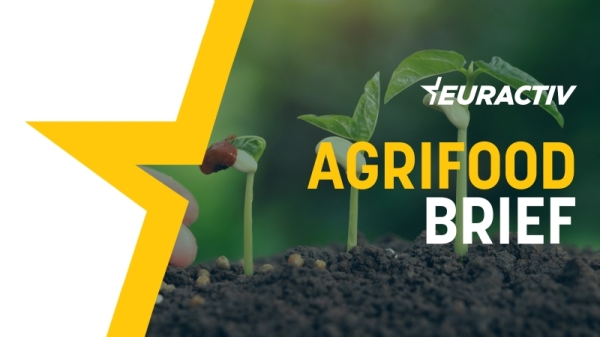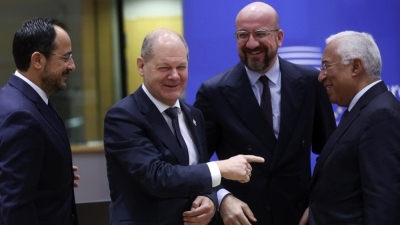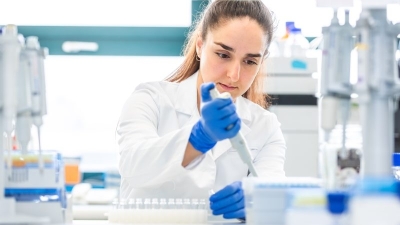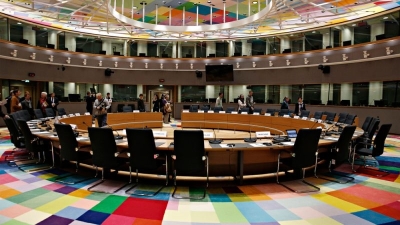Agrifood Brief: The great gene editing gamble

This week was originally meant to be the moment where EU agrifood stakeholders finally find out whether the Commission has chosen to take a gamble on gene editing – but instead, the proposal has found itself on the betting table in a political poker game.
Now, as per the Commission’s communication strategy playbook, nothing is ever ‘postponed’ in the bubble. Instead, agendas are merely ‘indicative’.
So, let’s just say that the indicative date for the new genomic techniques (NGTs) proposal was ‘not postponed’ from 7 June until 7 July, in the midst of growing contention around two green proposals – the sustainable use of pesticides regulation (SUR) and the nature restoration law (NRL) – from the Parliament’s centre-right group, the EPP.
But the real question now is: Will the Commission show its hand at all?
Because, with his Green Deal at risk of drawing dead, Vice President Frans Timmermans has raised the stakes of the game.
“For all of you in this chamber, there is a choice to be made; stick to your trenches and stick to the status quo, which means no SUR and no NGTs,” he warned the European Parliament’s agriculture committee on Monday (22 May), putting forward his best poker face.
But who really deals the cards here?
Asked whether Timmermans actually has the power to block play, a Commission official told EURACTIV that there is “no need for unanimity in college” but that, as a general rule, “no file can be brought to college unless the responsible [Executive Vice President] agrees to it”.
According to the official, even the “imminent launch of the interservice consultation does not automatically mean the file will come to college”.
Meanwhile, a Commission spokesperson said that the decision to go ahead with proposals “are taken by the college, which decides by consensus”.
But it seems the other players in this game are not ready to fold just yet, according to Ettore Prandini, president of Italy’s farmers’ association Coldiretti, who met with DG SANTE’s Sandra Gallini this week.
According to Prandini, Gallini promised there will be “no further prolongation, as threatened by Vice-President Timmermans, if other measures are not approved,” adding that Gallina also promised a “positive opinion” on NGTs from the EU executive.
Meanwhile, the EPP, the biggest political faction in the European Parliament, appears ready to call Timmerman’s bluff, doubling down on their anti-NRL stance in a press briefing and a series of social media posts this week.
So, with the European Parliament’s environment committee vote rapidly approaching, does Timmermans have an ace up his sleeve?
He might well have, and in an unexpected form – a coalition of industry players, primed with the help of an information pack put together by a platform called Business & Biodiversity, with the help of Corporate Leaders Groups (CLG Europe), a pan-European business network.
And it seems the push has been successful, with more than 60 businesses, from Nestlé to Unilever and IKEA, teaming up with scientists and green groups in support of the law.
Whether this last-ditch effort will be enough to see a full house of proposals is as yet unclear, but one thing is certain – Timmermans is ready to go all-in for his Green Deal.
Agrifood podcast: Polish Commissioner, Parliament protests & getting ‘grounded’

Agrifood podcast: Polish Commissioner, Parliament protests & getting ‘grounded’
This week, EURACTIV’s agrifood team talks you through the controversies at a recent meeting of EU agriculture ministers, including how the EU’s agriculture Commissioner is increasingly prioritising Polish issues, and discusses the pushback to the EU’s nature restoration law, both …
Agri-news you need to know
Ukraine
EU sides with its farmers over Ukraine. The main story this week is the news that the European Commission has chosen to extend temporary trade restrictions on four agricultural products from Ukraine to five European ‘frontline’ countries until September.
Quick refresher. The deal was deemed necessary after temporary trade liberalisation meant to help Ukraine export agricultural commodities led to an influx of goods in Eastern Europe, pushing prices down and local farmers to the edge. But Ukraine was urging the EU to ‘unconditionally’ drop all restrictions.
Why is this controversial? Well, for multiple reasons, one being that the measures will still apply despite the fact that one member state – Hungary – is still yet to meet the EU executive’s conditions for the extension. The communicative techniques of the Commission were also put into question after attempts to bury the news in its press statement on the matter.
‘Stress test’ for future trade talks. The news will be welcomed by EU Agriculture Commissioner Janusz Wojciechowski, who previously said the extension would be “best until the end of the year”. But is has ruffled feathers in Kyiv, with its deputy trade minister Taras Kachka telling reporters it is ‘irritating’ the decision has become so politicised, while its agriculture minister Mykola Solskyi added it was “inappropriate” to extend the restrictions.
But the criticism didn’t stop there. It wasn’t only Ukraine that took umbrage with the decision, with both Berlin and Madrid slamming the move and stressing the importance of continuing to support the war-torn country.
Meanwhile, in more Ukraine related news, the destruction of the Kakhovka dam, which has led to severe floods in parts of Ukraine, will likely impact both agricultural production and exports, according to the government in Kyiv, who estimated that around 10,000 hectares of agricultural land would be affected by floods on the Ukrainian-held right bank of the Dnipro river alone.
Nature restoration law
The EU’s nature restoration law continues to be a key theme this week, with a flurry of activity around the file. Let’s start with the press briefing given by the Parliament’s centre-right, in which MEPs reiterated their concerns over the law, which they say has nice intentions but is unworkable on the ground.
The stance has the backing of the EU farmers’ association COPA-COGECA, who have consistently spoken against the law. In a new statement this week, the chairman of the association’s environment working party, Niels Peter Nørring, stressed the Commission should “go back to the drawing board“. “EU authorities must respect and acknowledge that those who will be implementing this law do not see it as feasible, workable, nor implementable,” he said.
Dodgy dealings? The MEPs particularly took umbrage with what they see as the Commission “overstepping their mark” as an honest broker, citing meetings with the EU executive big dogs as well as lobbying from a platform called Business & Biodiversity, which they said was Commission funded.
However, EU Environment Commissioner Virginijus Sinkevičius defended such meetings as a normal part of his job in an exclusive interview with EURACTIV France, adding that he will continue to meet with MEPs to explain his side of the debate. “We don’t agree on everything, but our conversations have always been productive, and it has been extremely useful for me to hear their views,” he said.
Claims refuted. The association behind the platform, CLG Leaders, has also since released a statement stressing it is an “independent, cross-sectoral, pan-European business network” based on the membership model, which does “not receive any funds from the European Commission”.
Meanwhile, Commissioner Sinkevičius sent a non-paper to representatives of the European Parliament and national ministers, which provided negotiators with arguments to defend the planned Nature Restoration law against calls to scrap it.
Major businesses have also rallied in support of the law, with more than 60 businesses, from Nestlé to Unilever and IKEA, teaming up with scientists and green groups in support of the law.
Pesticides
But the nature restoration law isn’t the only one that hangs in the balance. The EU’s sustainable use of pesticides regulation (SUR) – which aims to slash the use and risk of pesticides in half by 2030, as set out in the EU’s flagship food policy, the Farm to Fork strategy – has also been under fire.
Renew’s Ulrike Müller, together with eight other MEPs, wrote to the Commission this week to stress that if farmers are expected to deliver on the SUR, it is “our duty to ensure they have the tools at hand”. “Before setting ambitious targets, we must do our part and deliver on the key enablers for agricultural transition, such as a functional framework for NGTs, but also an approval system that is fit-for-purpose for safer alternatives to harmful plant protection products” the letter reads.
‘Say goodbye to toxics’. NGOs, led by Slow Food Europe, have also teamed up in a new campaign to put pressure on political stakeholders, both at the national and EU level. The campaign provides a widget via which European citizens can easily send direct personalised emails to MEPs and national ministers in order to “remind them that the future of young generations and biodiversity cannot be ensured without pesticide reduction”.
Trade
Mercosur is back. The EU – Mercosur (Southern Common Market) is gearing up after years in a stalemate. With EU leaders and their Latin American and Caribbean counterparts meeting in July for the first summit since 2015, an announcement on the progress of this trade deal is expected.
Why now? The debate on the trade agreement gained traction again after a change of government in Brazil ended years of estrangement between key EU countries and the right-wing populist government of then-president Jair Bolsonaro.
Strategic siblings. But despite some EU leaders pushing back on the deal due to its foreseen impact on the domestic agricultural sector, the next country holding the presidency of the EU Council – Spain – is very much on the case to revive relationships with ‘sibling’ Latin American countries. Spanish Vice President and Minister of Economy, Nadia Calviño, told reporters in Brussels this week that Mercosur is “one of the priorities for their presidency.” She highlighted during the summit, to be held in July in the capital of the EU, Spain will “do everything possible to advance these agreements, which are very positive from an economic point of view but also a geopolitical one.”
Greens and farmers align. For different reasons, green groups and farmers are on the same side in this one. European farmers fear that such trade deal will open the doors to products that don’t have to comply with the same rules as them. Christiane Lambert, president of farmer’s organisation Copa, said during a press conference last month that “We can’t keep piling up the requirements for our farmers, and then open up the borders to products where we know that they don’t adhere to the same rules.”
More pesticides, antibiotics, lack of traceability. These are the findings of a study commissioned by the Greens in the European Parliament and presented this week. It also pointed out that the production of cattle will increase by 66% when the deal is implemented, impacting both prices and producers while also encouraging deforestation linked to cattle production. “It is important to state that these elements should be highlighted because there is a political willingness by somebody to ratify this agreement and especially the Spanish presidency,” said green MEP Saskia Bricmont.
In other trade news, the Commission’s latest monthly agri-food trade report, published this week, found that the EU agri-food trade further increased its surplus by 33% month-to-month to reach €5.4 billion.
CAP corner
EU green farming schemes fall flat in Germany after meagre farmer uptake. Eco-schemes, a new instrument within the Common Agricultural Policy (CAP) to reward sustainable farming practices, have been taken up by far fewer farms than hoped in Germany, according to new data from the country’s agriculture ministry.
Other agri-bites
More support for farmers. The European Commission approved a hefty €346 million (PLN 1.5 billion) Polish scheme to support agricultural producers in the context of Russia’s war against Ukraine this week, following a whopping €1 billion granted just a couple of weeks back.
OECD calls for focus on animal welfare standards. The organisation for economic co-operation and development (OECD) released its updated guidelines for multinational enterprises on responsible business conduct (RBC), which called on enterprises to respect international animal welfare standards for the first time.
Lastly, check out this op-ed by ex-agriculture Commissioner Dacian Cioloş, in which he argues reducing agriculture’s impact on the environment is a moral duty, but that the Commission’s ideologically driven, fragmented approach falls short of the mark.
Agrifood news from the CAPitals
ALBANIA
Drought in Southern Europe boosts demand for Albanian olive oil. The export of Albanian olive oil has quadrupled in 2023 when compared to the rate it sold in 2022, according to the Deputy Minister of Agriculture Arian Jaupllari, due in part to droughts in Spain and Italy resulting in lower production. Find out more. (Alice Taylor I Exit.al)
SPAIN
Minister calls to “work together” amid strawberry crisis. As Spain’s strawberry sector is hit hard by drought and irrigation restrictions, agriculture minister Luis Planas has pledged his “full support” to the affected farmers, adding the “best defence” against the crisis is “continuing our joint work.” EURACTIV’s partner EFE Agro has more.
GERMANY
Germany gets first animal welfare commissioner. In a first for the country, Germany’s agriculture ministry has created the post of a government animal welfare commissioner, who will take up work on Monday. Veterinarian Ariane Désirée Kari, who was selected for the role, said in a statement she looks forward to “giving a voice to animals” at the federal government level. According to the ministry, the commissioner’s job description includes supporting the minister’s work on animal welfare through recommendations and working on national or European initiatives in this area. (Julia Dahm I EURACTIV.de)
AUSTRIA
Floodplain good practice. To boost the protection of meadows and floodplains in Austria, the agriculture ministry has issued a brochure showing best practice examples on the “protection and restoration” of such landscapes. “Our domestic meadows are indispensable for biodiversity and natural flood protection,” minister Norbert Totschnig said in a statement. (Julia Dahm I EURACTIV
Events
11 – 13 June | Informal AGRIFISH Council meeting
12 – 15 June | Parliament plenary, including a debate and vote the ‘ensuring food security and the long-term resilience of EU agriculture report’ on 14 June as well as a debate on the water crisis in Europe on the same day
12 – 13 June | International Grains Conference (London)
12 June | Conference on enhancing cooperation for a greener agri-food supply chain
13 June | Civil Society Dialogue meeting on EU trade policy
15 June | ENVI committee meeting
Read more with EURACTIV




